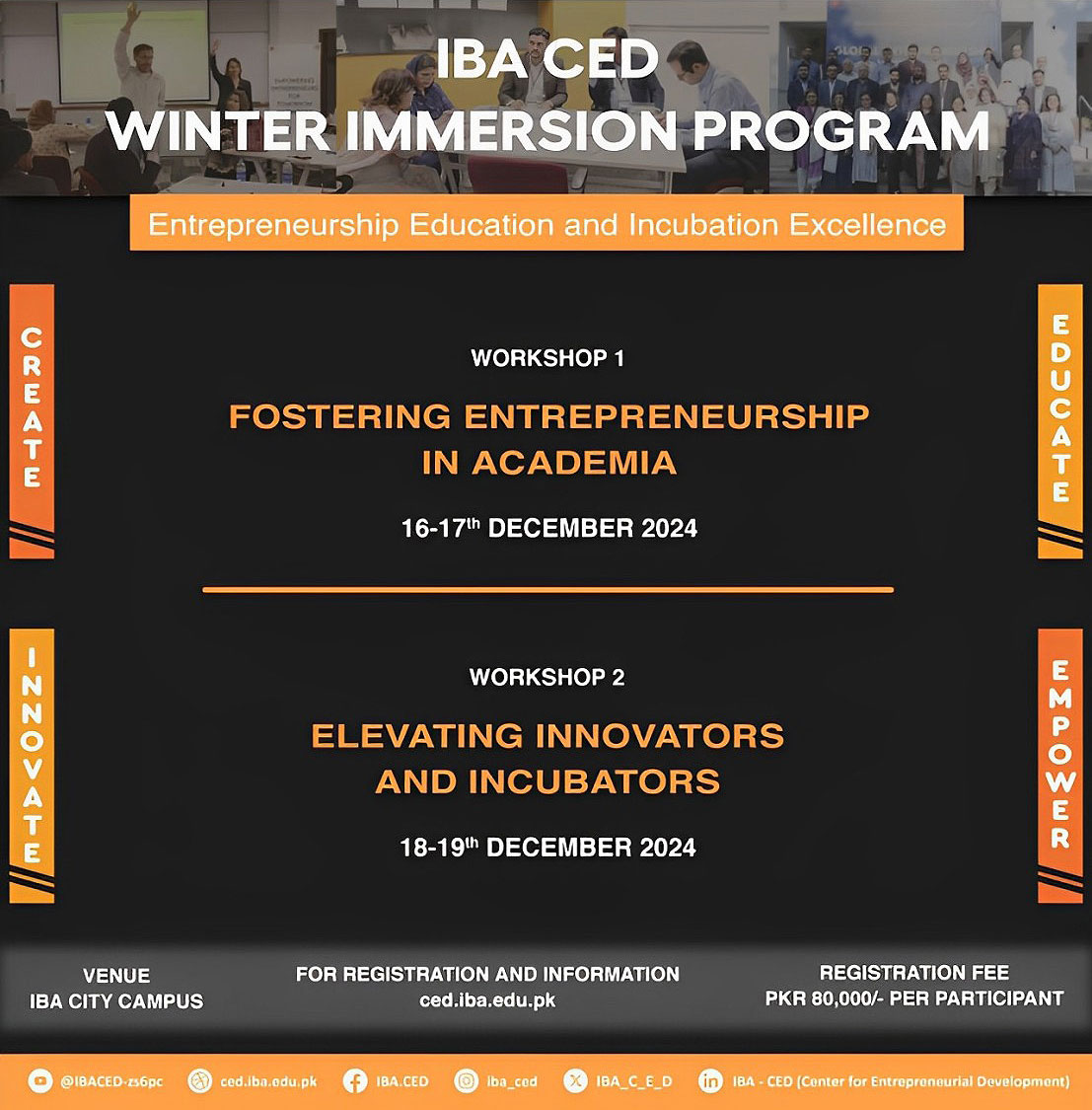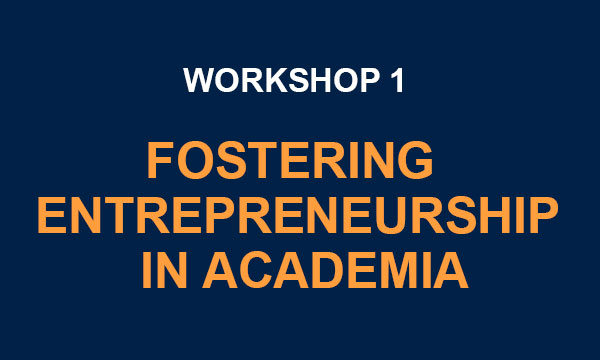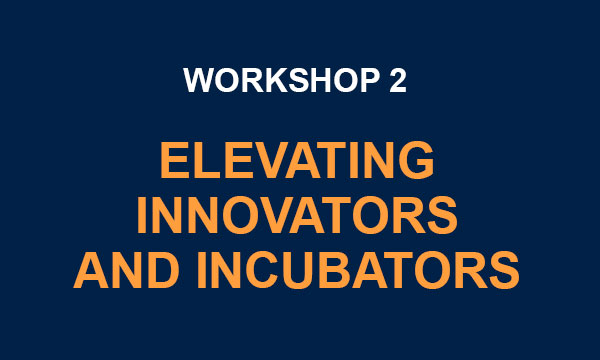Apply Now
Overview
Entrepreneurship Education & Incubation Excellence
IBA-CED Winter Immersion Program-2024, is a week-long academic program, designed to provide university faculty and incubator management teams with a robust expertise in entrepreneurship education and incubation management. The program will deliver cutting-edge knowledge, strategies, and best practices to ensure excellence of entrepreneurship initiatives within academic institutions.
By bringing together participants from diverse backgrounds, the program will create a collaborative environment where ideas are shared, networks built, and cutting-edge knowledge disseminated. Winter Immersion Program provides an excellent opportunity to develop a dynamic and resilient entrepreneurial ecosystem along with leaving an indelible mark on the future of business and education in Pakistan.

- THE PROGRAM FEES: PKR 80,000/- (EXCLUDING APPLICABLE TAXES)
- LIMITED SEATS. NOMINATIONS ON FIRST COME FIRST SERVED BASIS ONLY.
- GROUP DISCOUNT: 20% (FOR A GROUP OF 3 OR MORE)
- EARLY BIRD DISCOUNT 20% (REGISTER BEFORE 1st December 2024)
Note: All 'Exclusive' or 'Early Bird' discounts are subject to availability and require payment before the deadline date in order to receive that discount.
Workshop 1
Fostering Entrepreneurship in Academia
The Workshop on Fostering Entrepreneurship in Academia is an intensive two-day program scheduled for 16th and 17th December 2024 at IBA, City Campus. This workshop is tailored for university faculty members from all disciplines who seek to integrate entrepreneurship education into their teaching. Led by renowned educators from around the globe, participants will gain hands on knowledge, tools, and resources needed to create and deliver engaging entrepreneurship modules or courses within their existing curricula.
Key Learning Objectives
- Foundations and different models of Entrepreneurship Education
- Main elements & Implementation of Entrepreneurship Education
- The pedagogy of Entrepreneurial Learning and processes in practice
- Entrepreneurial Competences and Learning outcomes of Entrepreneurship Education
- Transformation from Teacher to process Coach and role in implementing entrepreneurship education
- Assessment in entrepreneurship education
- Entrepreneurship education action plan or entrepreneurship research possibilities
Target Audience
- University faculty members from all academic disciplines seeking to introduce or enhance entrepreneurship education within their departments.
- This workshop is particularly beneficial for educators interested in:
- Integrating entrepreneurial concepts and activities into existing courses
- Developing new entrepreneurship-focused modules or courses
- Encouraging a culture of innovation and creative problem-solving within their classrooms.
Expected Outcomes
- Participants will gain a comprehensive understanding of the core principles and frameworks to integrate entrepreneurship education into various academic disciplines.
- Through interactive exercises, participants will develop practical strategies to foster entrepreneurial competencies, behaviors, and a culture of innovation within their classrooms
- The workshop will introduce participants to diverse pedagogical approaches specifically suited to teach entrepreneurship, including:
- Problem-based learning simulations
- Case studies and business plan development exercises
- Guest lectures from industry experts and successful entrepreneur
- Collaborative project-based learning activities
- Participants will be presented with successful case studies showcasing the effective integration of entrepreneurship education across different academic departments at leading universities.
- By the end of the workshop, participants will have drafted concrete action plans to implement or enhance entrepreneurship education within their own faculties. These action plans include specific strategies for curriculum development, resource identification, and assessment methods.
About The Trainers

Joachim Ramström
Senior Lecturer in Marketing,
Turku School of Economics,
University of Turku, Finland
For more than 15 years, Joachim has dedicated himself to Entrepreneurship Education. He's deeply engaged in learning methodologies, particularly team-based and project-oriented approaches, as well as programs aimed at developing entrepreneurship coaches. With a PhD in International Business and Strategy, his expertise lies in cross-cultural business relationships within Southeast Asia. Presently, his research focuses on enhancing team and entrepreneurship learning within university settings and the development of practical competencies for the professional world during university education.

Dr. Sanna Ilonen
Teacher of Entrepreneurship
Department of Management and Entrepreneurship, School of Economics,
University of Turku, Finland
Dr. Sanna Ilonen, a university teacher and Entrepreneurship Program lead, has dedicated over a decade to entrepreneurship research and education in higher education. Her research focuses on entrepreneurship education and work-life balance for serial entrepreneurs. Dr. Ilonen has been published in esteemed international journals and successfully defended her dissertation in 2020. She's a passionate educator, recognized for teaching excellence, and actively contributes to the Finnish Scientific Association for Entrepreneurship Education as a board member and the chair of the National Entrepreneurship Education Conference organizing committee in Turku.
Workshop 2
Elevating Innovators and Incubators
The Workshop on Elevating Innovators and Incubators is an intensive two-day program scheduled to run from December 18-19, at IBA’s City Campus. The workshop is designed to equip faculty of universities, directors of incubation centers, ORIC’s and entrepreneurship & innovation centers, with the necessary hands on knowledge and skills to design and manage a thriving university-based business incubator program. The curriculum will draw on best practices drawn from globally established incubators and entrepreneurship centers. Furthermore, the event will feature a combination of lectures, interactive discussions, and case studies.
Objectives
- Equip participants with the knowledge to design and manage a successful university-based business incubator.
- Foster an understanding of why startups fail and how to create a supportive environment for entrepreneurial success.
- Enable participants to develop a comprehensive service package tailored to different stages of the entrepreneurial journey.
- Teach participants to build a robust entrepreneurial ecosystem by identifying and engaging key stakeholders.
- Guide participants in creating a sustainable financial model for their incubator program.
- Develop a compelling value proposition to attract high-potential startups.
- Facilitate the creation of a collaborative network of universities and incubators in Pakistan for knowledge sharing and ecosystem building.
Expected Outcomes
- Participants will gain a comprehensive understanding of the essential elements for establishing and operating a successful university-based incubator program.
- A collaborative action plan will be developed by Trainer and IBA-CED to guide the development and implementation of university incubators in Pakistan.
- Participants will be equipped with practical tools and strategies for:
- Identifying and attracting high-potential startups
- Developing a sustainable financial model for their incubator
- Designing a service package tailored to support early-stage ventures
- Building a robust network of stakeholders within the entrepreneurial ecosystem
- A network of universities and incubators in Pakistan will be established to foster knowledge sharing and collaboration in the entrepreneurial ecosystem.
Target Audience
- University faculty members, including entrepreneurship and business faculty
- Directors, managers, and representatives from Offices of Research, Innovation, and Commercialization (ORICs) and Business Incubation Centers (BICs)
- Founders, managers, and stakeholders from privately operated incubation centers and accelerators
- Key players in the startup ecosystem, including venture capitalists, angel investors, and startup mentors
- Representatives from corporate incubation centers and innovation hubs
- Government and policy representatives supporting entrepreneurship and innovation initiatives
- Industry partners and corporate leaders with interest in supporting or collaborating with incubators and startups
- Professional associations and networks focused on entrepreneurship and small business development
About The Trainer

Islam Mohamed
CIO, Founder, and Visionary Leader in Social Enterprise and Technology Commercialization
Islam Mohamed is a visionary leader with over a decade of international experience in entrepreneurship, investment, and technology commercialization. As the Chief Investment Officer at Arweqah, a leading social impact catalyst in Saudi Arabia, he drives the scouting, investment readiness, and scaling of global startups, ensuring they make a transformative impact in the Saudi market. Islam’s work has contributed to raising over $210 million in funding from multi-donors, governments, and angel investors. Having founded five startups, Islam possesses a hands-on understanding of the challenges and needs of early-stage ventures. His work focuses on preparing startups for investment, helping them align their strategies with investor expectations, and guiding them through the critical stages of growth and market entry. He has personally mentored over 500 startups across diverse sectors, offering expertise in everything from product validation to scaling.
Islam’s leadership extends into designing complex operational processes within educational institutions, resulting in the commercialization of innovative technologies. His work has bridged the gap between academia and industry, particularly during his tenure as Director of the Science and Innovation Park at the British University in Egypt, where he led the park’s strategy and operations, generating 400% revenue increase in 2022.
Throughout his career, Islam has held multiple advisory roles, supporting incubators and accelerators. As a Senior Advisor with USAID, he transformed five university-based business incubators into financially sustainable entities, equipping them with effective management tools and capacity-building strategies. His consulting engagements span across numerous organizations, including the African Development Bank, USAID and EU. A certified designer of startup programs by Babson College, Islam continuously innovates within the entrepreneurial and academic landscapes. He has led the design and delivery of over 50 business bootcamps and hackathons, including high-profile initiatives such as the Oxford Cairo Innovation Camp and UNESCO’s Nanotechnology Entrepreneurship Bootcamp for African entrepreneurs.
- Course Material
- Lunch and Tea
- Socializing & Networking Opportunity
- Group Photograph and Certificate of Attendance
Note: For more information regarding registration process, please feel free to call registration focal person

